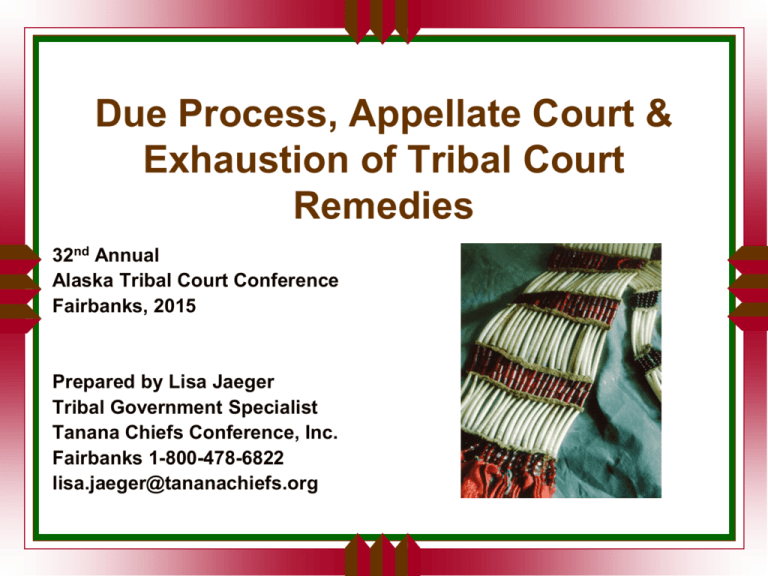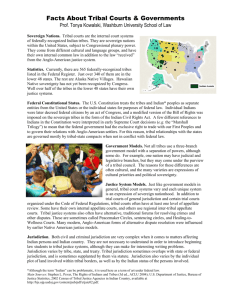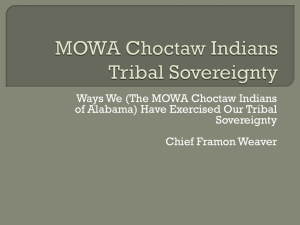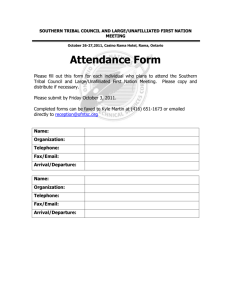Due Process, Appellate Court & Exhaustion of Tribal Court Remedies
advertisement

Due Process, Appellate Court & Exhaustion of Tribal Court Remedies 32nd Annual Alaska Tribal Court Conference Fairbanks, 2015 Prepared by Lisa Jaeger Tribal Government Specialist Tanana Chiefs Conference, Inc. Fairbanks 1-800-478-6822 lisa.jaeger@tananachiefs.org Due Process is the right of people involved in a court case to have the court proceed in steps that will be fair to everyone. The United States Constitution/Bill of Rights requires the federal and state courts to provide due process. The Indian Civil Rights Act of 1968 requires tribal courts to give due process. Andy Harrington………Due Process John v Baker Alaska State Supreme Court September 1999 “Do Alaska Native villages have inherent, non-territorial sovereignty allowing them to resolve domestic disputes between their own members?….we hold that Alaska Native tribes, by virtue of their inherent powers as sovereign nations, do possess that authority.” “Federal tribes derive the power to adjudicate internal domestic matters, including child custody disputes over tribal children, from a source of sovereignty independent of the land they occupy.” “…state courts should afford no comity to proceedings in which any litigant is denied due process….but this due process analysis in no way requires tribes to use procedures identical to ours in their courts” Andy Harrington……..Best Practices for Tribal Courts 2014: Parks v Simmonds (Alaska Supreme Court) Parties have to ‘exhaust tribal remedies’ before they can run to the state or federal government. What is an Appellate Court? The purpose of an appellate court is to review the tribal court processes in a specific case to examine if the court was fair and due process was provided: • • • • Notice Opportunity to be heard Fair hearing The court acted according to applicable Tribal and federal laws • Law was equally applied They do not re-hear the case, but only look at the process. They look for errors in procedures, errors in facts, or due process. • The judge/s made a mistake in the application of tribal law • There was some kind of misconduct such as a conflict of interest • The decision of the court was unreasonable to make based on the evidence Structures for Appellate Courts If the tribal court is separated from the tribal council, the tribal council is often used as the appellate court. Other ideas for appellate court structure: • An inter-tribal court set up between villages • An elected or appointed panel of judges who do not sit on the regular tribal court Procedures for Appellate Courts Procedures are according to what the tribal judicial code says, but typically the process is something like: • Appeal is filed within a set amount of time after a final court Order is received by a party. 30 days is typical • Clerk notifies the appellate court judges and sets a time for the appellate court judges to review the appeal and the tribal court records. • The judges may decide to deny the appeal, or they may decide to hold a hearing on it. • Hearing date is set, notice is sent out, and at the hearing, all parties discuss the issues listed in the appeal. • Judges make their decision What action can they take? Describe it in your code! For example: Options for Decisions of the Appellate Court: After finishing a hearing or hearings on a case, the Appellate Court shall take one of the following actions: 1. Uphold the procedures and decision of the Tribal Court; 2. Order the Tribal Court to re-hear the case in a way that is consistent with specific instructions written in the Decision of Appeal; or 3. Dismiss the case in the most serious of circumstances. One of the unique challenges to operating appellate courts we have experienced in the Tanana Chiefs Conference Region is the infrequency of their use. In the situations where two or more tribal courts combine together to hear cases, the tribes should decide who’s rules will they be following, and what will they do if a party wishes to appeal. Due Process • • • • Notice of Hearings Opportunity to be heard Fair and impartial judges Fundamentally fair: treat people equally – Best Practices • • • • Following your own rules Explaining your decisions Keeping record of court proceedings Having an appellate process Alaska Tribal Courts are fighting for respect from state and federal courts as well as from their own tribal members. The path to gain that is to be fair, provide due process in the way that is appropriate to the tribe, and provide an appellate court to guarantee basic due process.









